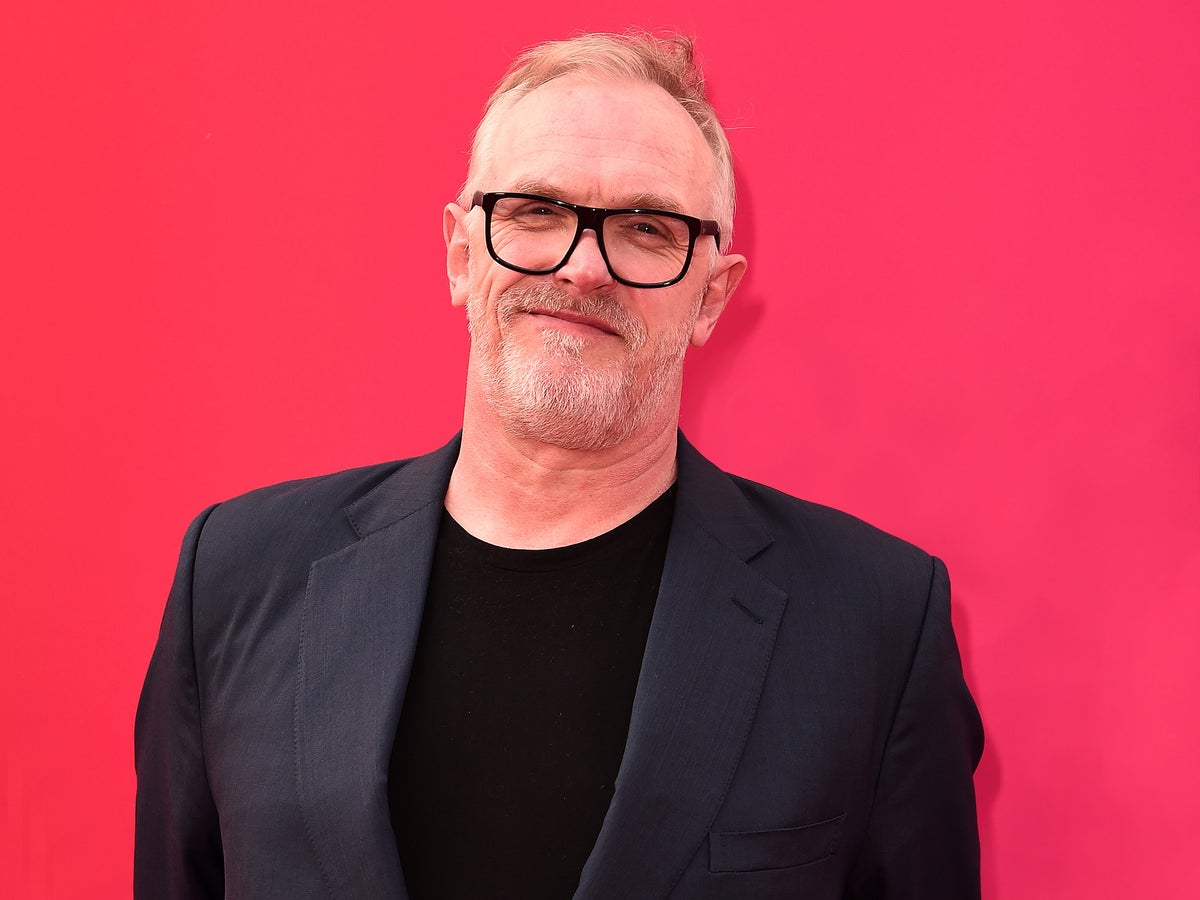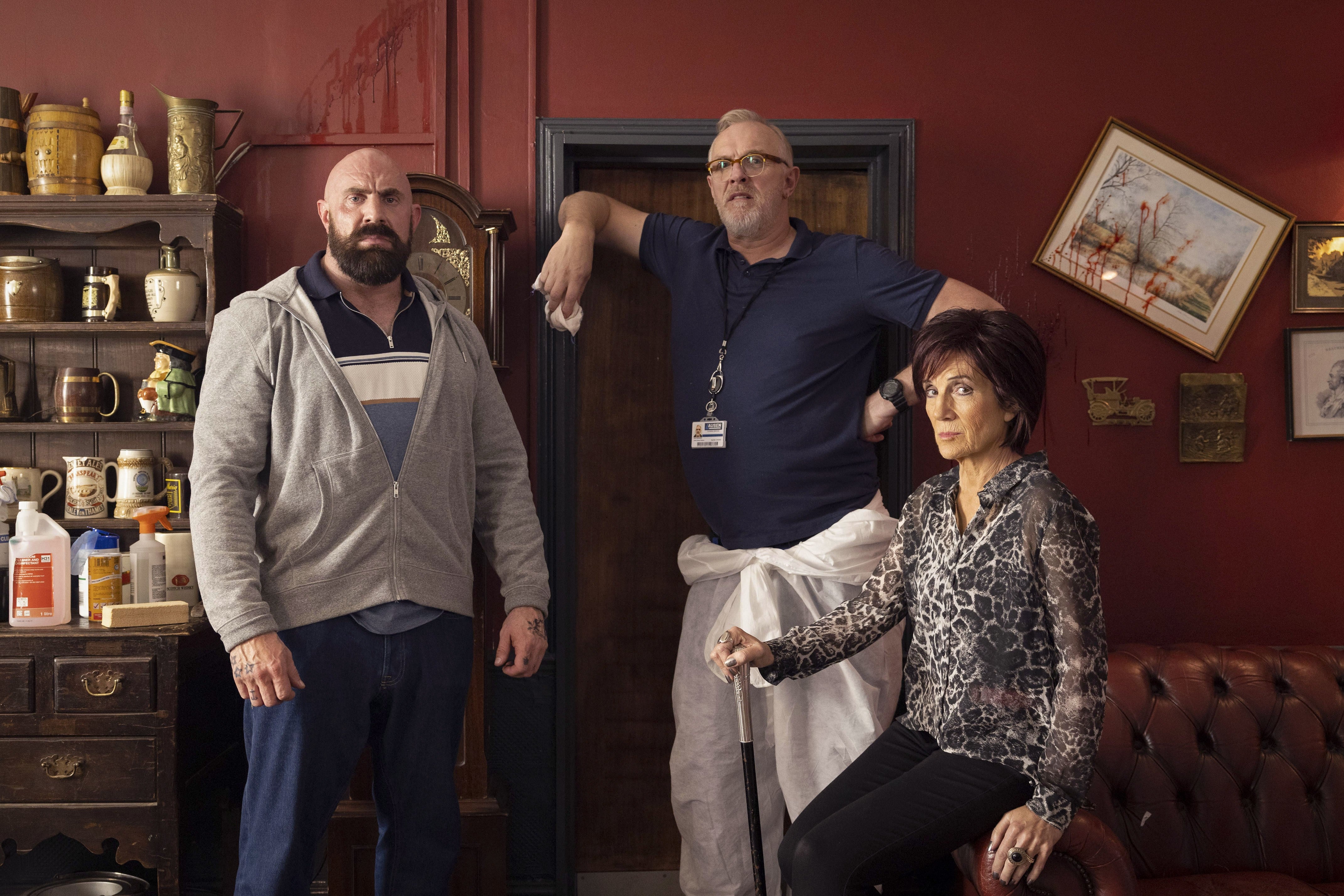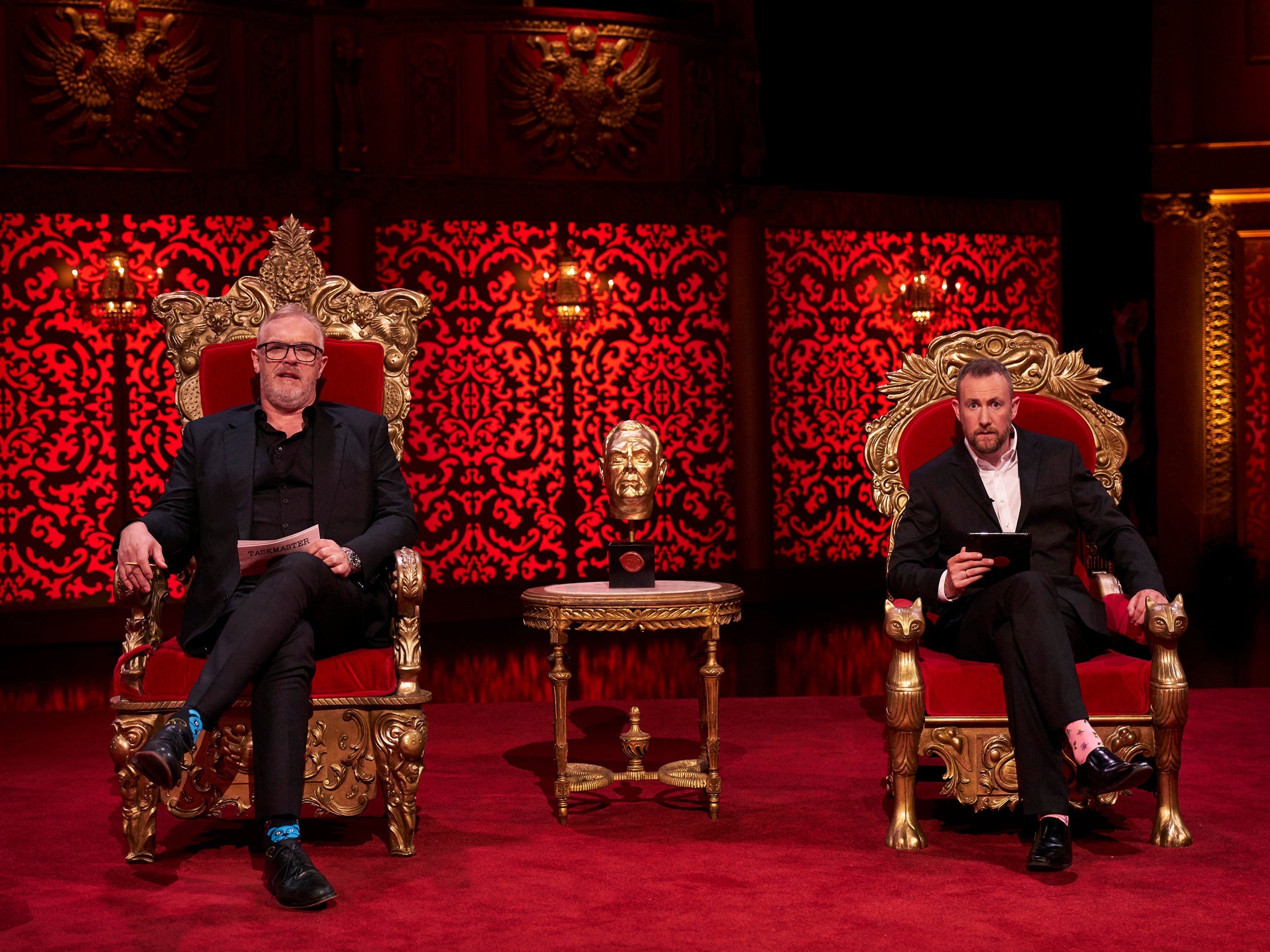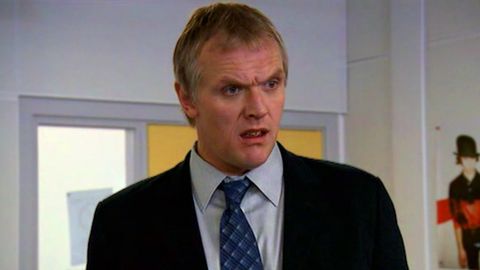
You might think crime-scene cleaning is very technical,” says Greg Davies. But the comedian best known as the host of Taskmaster and Never Mind the Buzzcocks says he spoke to a real crime-scene cleaner as part of the research for The Cleaner – “and he said the most important tool in his kit was a big bag of towels. He said, ‘You toss a load of those onto the blood and get the worst of it up. It’s just human matter at the end of the day.’”
But while Davies’s quirky sitcom – back for a second season on BBC One – uses the biological residue of violent death to comic effect, The Cleaner’s appeal lies in its poignant exploration of what matters to the humans still occupying the scene. Each episode begins with Davies’ hazmat-suited character – Wicky – arriving at a different location with his bag of towels and bottles of bleach and being confronted by an emotional mess that he’s far less equipped to process.
The first series, which aired in 2021, began with him being held at gunpoint by a suburban housewife (played by Helena Bonham Carter) who wanted him to understand why she’d stabbed her boring husband 38 times, splattering their orderly kitchen scarlet. Later he’d help an irritable novelist (David Mitchell) express his grief for the grandmother killed by an exploding log burner, and hear from an aristocrat (Stephanie Cole) in whose home a hapless burglar has met his end. The second season continues to lure in top-drawer guest stars (including Succession’s Harriet Walter, Zoe Wanamaker and Asim Chaudhry) and finds Wicky forced to get his head around hot topics ranging from internet conspiracy theories to the debate over which statues should remain in public spaces.
Talking over a video call from his south London home, while he makes himself a coffee, the ostensibly easy-going Davies expresses mild astonishment that he’s still being allowed to write himself “fairly intense” two-handers casting himself opposite “proper actors”. “I mean, Harriet Walter is a Grand Dame of British Theatre, isn’t she? She’s very well-spoken. I found it fascinating to watch her put on a blouse and transform into the owner of a very rough pub. And Zoe Wanamaker! She’s such a gentle, warm person and we got to see her metamorphose into a fairly unsavoury bigot.”
Is he ever intimidated by their thespy chops? “No,” he laughs. “I think that by a certain point in life you have to be comfortable with what gifts you’ve got. I know what I’ve got. I know what I bring. I can’t imagine an Olivier Award is ever coming my way. But you just do your best, don’t you?” He says that playing the “naive everyman, parachuted into all these surreal situations” isn’t too much of a stretch for him because – as a former drama teacher who didn’t take to the stage until his thirties and made his mainstream breakthrough as the terrifying head of sixth form in The Inbetweeners the year he turned 40 – he can still feel like a civilian lost in the bizarre world of showbiz.
“Wicky would just like to be down the pub having a pint with his mates and I really relate to that,” he nods. “That’s where I’d like to be most of the time too. But forcing him to confront more left-field ideas is the point. Often, I’m educating myself on these subjects along with the character.” Like the new episode in which Wicky encounters a shaman with a dead fox on his head who encourages the cleaner to try and commune with the recently deceased?
“Ha! A better example is the Christmas Special where we cast an autistic actor as an autistic character. Somebody on the set – quite possibly me – used that cliche about everyone being somewhere on the spectrum and the actor said: no, they’re not. He explained how annoying neurodiverse people find it when people say that kind of thing. Because we’re not ‘all a bit autistic’. I didn’t know that – why would I? But I learnt something and the line went straight into the script.”
He reminds me that in the German show on which The Cleaner is based, the main character is “a moral guy who definitely makes judgements but you don’t get to know too much about him, whereas we’ve slowly picked away at the layers of Wicky’s onion. When you pop people in extreme situations, they end up talking about things that may have been buried in the subconscious. Things they haven’t faced up to…” Things like the fact that neither you nor Wicky are as “normal” as you like to think? Davies shrugs. He knows that a performer’s need to “seek the validation of strangers is peculiar… But I don’t like to get too introspective about it because I’m worried about what I might find out about myself!”

Born in Wales in 1968 and raised in Shropshire, Davies tells me he came from a “very, very funny” family of worriers. “Me, my mum, my sister? We could all be on the most perfect, sun-drenched beach with nothing to do and we’d start making a list of things to worry about.” He tells me he’s still “a terrible sleeper” who wakes at 3am “which is when the brain starts processing anxiety… unless you’ve had a bowl of porridge an hour before you go to bed, so the slow release energy of the oats prevents the crash that wakes you up”.
Most people assume that Davies began cracking jokes as a boy as a means of deflecting attention from his height (he’s 6ft 8in). But he says he only really began riffing on “things people said because I was tall” when he started stand-up. “In the playground in Shropshire, me and my nerdy friends would invent these very silly, very detailed backstories for kids we didn’t know.” He chuckles. “There was a kid in my year who had incredibly well-ironed trousers. I never spoke to him, never knew anything about him, but we’d pretend he lived in a house that was entirely dedicated to creating the perfect crease. We imagined his whole home was a giant machine that he fed his trousers into at night and in the morning it would loudly proclaim: YOUR TROUSERS ARE READY!”
He credits an English teacher – Derek Evans – for sparking the hope he might one day be able to build a career in comedy. Clearly emotional, he recalls how he “wrote and recorded a comedy album of silly songs with my friends and gave a copy to Mr Evans. He wrote us a full, track-by-track review of it that was really kind and complimentary. He said he thought we were funny, that we should keep going and developing it. I can’t tell you the impact that kind of encouragement has on a kid. It’s one of the reasons I’m still doing this nonsense. Because somebody told me they saw that potential when my brain was being formed. I’m hoping to get in touch with him to thank him for that now.”

But before Davies could realise that potential, he took his lecturer dad’s advice about a sensible career and spent 13 unhappy years as an English and Drama teacher. Some aspects of that period fed into his 2013 sitcom Man Down, in which he played an inept educator and which was filmed in the school where he once spent miserable break times stubbing out cigarettes on the brickwork. Today he tells me he did enjoy some days with his students, many of whom send him messages online to thank him for being a laugh and to point out they’d always known he was “bluffing”, “incompetent”.
“I remember teaching a low-ability English class about George Orwell’s Animal Farm. Most of the time I taught I was two pages ahead of the students, so we all learnt about the Russian Revolution together and I’ll never forget them. In one frantic question-and-answer session a child in that group asked me if I could do the Lambada, just because he wanted to know at that moment. I told him I couldn’t. He seemed satisfied with that answer and we went back to talking about communism. It was chaos! But I learnt as much – if not more – than most of the kids in that class. My A-level Theatre Studies class may feel differently, because I had to teach them about Bertolt Brecht and to this day I don’t think I really understand his work.”
He doesn’t have much to say about the state of teaching today although he’s unimpressed with Rishi Sunak’s plans to force children to study maths until they’re 18. “Being made to do any more maths than necessary would have been awful for me. Maths was my nemesis at school – if a subject can be a nemesis. I was and remain bad at it. Yet I have a career! I’ve never once needed it. So I think it’s fine to make sure people are mathematically competent, but people need to learn to express themselves in ways that are more suited to them.”
It was a very practical girlfriend who told the 33-year-old Davies to stop moaning about teaching and give comedy a shot if that was what he wanted. He admits that he regrets focusing so much on his distinctive appearance at first, and when it comes to stand-up (including his recent Netflix special) he fears he’s still not quite back up to the distinctive style he’d honed as a kid. His suppressed dreams are processed through a new episode of The Cleaner about a married father who’s walked away from a lucrative career in finance to pursue his dream of being a clown: conjuring poodles from balloons and moments of suspended magic from thin air.
I’m 54 and I don’t think I’ve been physically fit at any point since I was about 11. I really would like to be
“I was fascinated by the question of when you should give up on a dream, on when it might be a delusion,” he says. “For years, the message coming from a lot of people surrounding me (along with my own brain) was: give up on the comedy dream.” He shrugs. “Thank God I did give it a go because I love what I do. What’s interesting about that episode is that the clown is not good at what he does. But I love the fact that he is rubbish, and we realise that it’s OK for him not to be very good if he’s having a good time.”
What dreams has Davies given up on? “Oh, the dream of being in a band. I mean, I was in a band in the 1990s and we realised we either had to be good-looking or exceptional songwriters. We were neither! But I still sing along to loads of songs in the car and imagine I’ve been called by some manager and asked to step in and take the mic on stage at Wembley…”
He still gets to indulge his passion for music on Buzzcocks. And on Taskmaster he gets to preside over a newer, warmer, more inclusive form of panel show. The cult comedy series (devised by Alex Horne in 2009 and now in its 15th series) in which comedians are set silly challenges and judged by Davies marked a refreshing shift away from the brutal competition (often between white, Oxbridge-educated males) that had come to define the British panel show. Horne consciously set tasks that evaluated competitors on a very broad range of physical, emotional, logical and plain daft skills. Comics like the sensitive Mark Watson (who described how he’d been traumatised by appearances on other panel shows in his recent memoir) and autistic Fern Brady have both said that Taskmaster offered very different opportunities to be themselves. Those who’ve been privileged enough to expect to ace a panel show have often been left floundering, with Cambridge-educated David Baddiel reduced to spluttering “I’m very clever, you know,” after fluffing his tasks.
Davies says he was “very aware of that [white, male, Oxbridge] comedy culture when I started out. But I hope it’s in its death throes now.” A headshake. “With Taskmaster, we consciously tried very hard to foster a playful and joyful environment. Instead of pitting comics against each other we want to give them space to enjoy what their opponents are doing. I mean, it’s less relaxed in the studio because we’re always pedalling like mad to make it look like a joyful event. And looking joyful is hard work. But we all want everyone to come out of that show feeling both celebrated and roundly mocked.”

He admits he’s amazed that – given the physically risky nature of some tasks – there have been relatively few accidents on Taskmaster. “The worst was definitely when Jessica Knapett fell off the stage. The stage is called ‘The Knapett’ and has its own little plaque. And I am pathetically proud of the fact that I quickly jumped out of my seat to save her. Even though I didn’t get anywhere near her and wouldn’t have saved her. I still watched it back and narcissistically thought: ‘Oh, that’s so good of you to almost save her!’I find it funny that I can congratulate myself for something I didn’t achieve.”
He is equally self-mocking about the fact an anecdote he told about Helena Bonham Carter on The Graham Norton Show has racked up more views than his sitcoms or stand-up shows. “It’s always the way: you spend years working on something and then you’re asked more questions about a silly story you told on a chat show!” The story was about how Bonham Carter suffered from a hilarious burst of wind when they were filming The Cleaner, and then laughed so much she wet herself. But Davies handled it all decently.
“I would never talk about somebody in public without seeking their permission. So I rang Helena and said I might tell that story about you farting on set and wetting yourself. She’s a great laugh and she said: ‘Go for it!’” He admits that he’s wary of coming off like a “Graham Norton superfan, although I am” but then explodes into a burst of praise for the chat show host’s “ability to get beneath the Hollywood veneer” of stars like Ryan Gosling (who could hardly breathe listening to one of Davies’s ribald anecdotes) and “find the human warmth. It’s something Graham can do by being obviously naughty but fundamentally kind”.
As Davies has succeeded in his dream of making a career in comedy, I wonder if he has any dreams left in his bucket. He smiles. “I’d like to achieve some level of calm. I would like, at one point in my life, to be physically fit. I’m 54 and I don’t think I’ve been physically fit at any point since I was about 11. I really would like to be.” He says he’s tried every fad for two weeks. “I’ve been a vegan for a fortnight. A runner, a wild swimmer, I’ve done meditation – all of that for 14 days and then I give up and guzzle on booze and pies.” I do notice he has a shelf of exotic-looking liqueurs and spirits running around the top of his spacious kitchen. It looks fun, but maybe too tempting for a guy who could reach any bottle without a ladder.
He laughs again. “I just need to stop eating what I want to eat and do the exercise. It’s that simple. It’s got to happen because I don’t want to die early. I do quite enjoy life!”
‘The Cleaner’ is out now on BBC iPlayer







